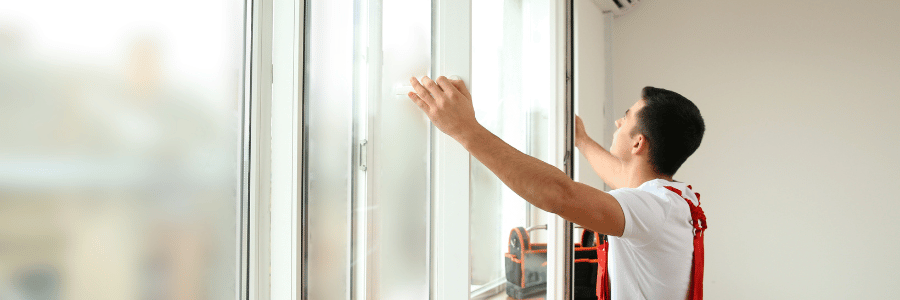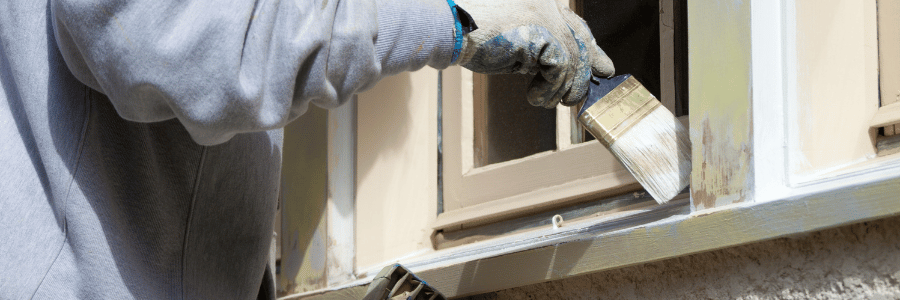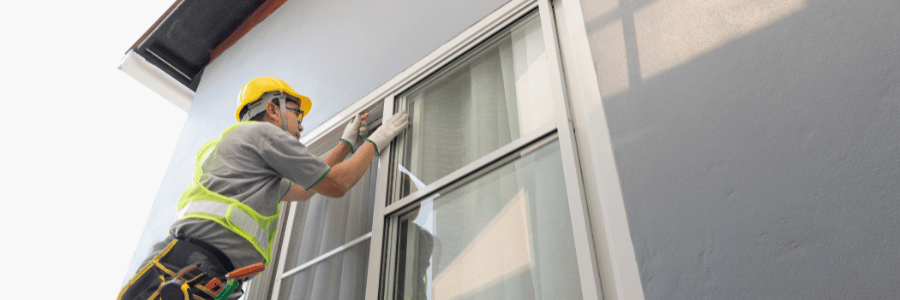Your windows do more than just allow natural light into your home; they also contribute to your home’s insulation, security, and overall aesthetic. One key component of maintaining functional, beautiful windows is caring for the window frames. Whether your frames are made of wood, vinyl, aluminum, or fiberglass, each material requires different care to keep them in top condition. Proper window frame maintenance not only extends the life of your windows but also improves energy efficiency, prevents damage, and ensures that your home remains safe and secure.
In this guide, we’ll walk you through the steps and tips for maintaining your window frames, depending on the material, as well as general best practices for keeping your windows in optimal condition.

1. Why Window Frame Maintenance is Important
Before diving into the specifics, it’s important to understand why maintaining your window frames is essential. Window frames bear the brunt of the elements, including rain, wind, extreme temperatures, and UV rays. Over time, this exposure can cause wear and tear, leading to problems like drafts, water leaks, and compromised security. Here’s why regular window frame care is so important:
- Preventing Energy Loss: Poorly maintained window frames can lead to air leaks and gaps, causing heat loss in winter and cool air loss in summer. This makes your HVAC system work harder and increases your energy bills.
- Extending the Life of Your Windows: Regular maintenance helps prevent premature deterioration, allowing you to get the full lifespan from your windows and avoid costly replacements or repairs.
- Improving Home Security: Well-maintained window frames help ensure that your windows remain properly sealed and secure, protecting your home from break-ins or intruders.
- Enhancing Curb Appeal: Windows are a prominent feature of your home’s exterior. Regular care ensures they look aesthetically pleasing and contribute to your home’s overall curb appeal.
2. General Window Frame Care Tips for All Materials
No matter what material your window frames are made from, there are a few maintenance practices that apply universally. Here are some general tips to keep your window frames looking and functioning their best:
- Clean the Frames Regularly: Dust, dirt, and debris can accumulate on window frames, so it’s important to clean them regularly to prevent buildup. Use a soft cloth, mild soap, and water to wipe down the frames. Avoid harsh chemicals that could damage the finish or materials.
- Check for Gaps or Leaks: Periodically inspect the edges of your window frames for any signs of air or water leaks. If you find any, it may indicate that the seals or weatherstripping have worn out and need replacing.
- Inspect for Damage: Look for any visible cracks, chips, or signs of wear on your frames. Over time, even the most durable materials can experience damage, and addressing these issues early can prevent more costly repairs later.
- Lubricate Moving Parts: If your windows have moving components, such as sliders, hinges, or locks, be sure to lubricate them regularly with a silicone-based spray or other appropriate lubricant. This keeps the windows opening and closing smoothly and prevents rust and wear.
- Seal Around the Window: Over time, caulking around the edges of your window can break down. Regularly check the caulking for gaps or cracks and reseal them as needed to prevent drafts or moisture from getting in.

3. How to Care for Wooden Window Frames
Wooden window frames are known for their classic charm and natural beauty, but they do require more maintenance than other materials. Wood is prone to moisture damage, rotting, and warping if not properly cared for. Here’s how to maintain wooden window frames:
- Clean and Dry the Frames: Wood can absorb moisture, which can lead to warping or rotting. To prevent this, wipe down the frames with a soft cloth and make sure they’re completely dry afterward. Avoid leaving excess moisture on the wood.
- Paint or Stain Regularly: Wood frames need a protective coat of paint or stain to protect them from moisture, UV rays, and general wear. Repaint or re-stain your frames every 3-5 years, depending on your climate. Choose a high-quality, weather-resistant paint or stain designed specifically for exterior wood.
- Inspect for Rot or Mold: Wooden frames are susceptible to rot and mold, especially in areas with high humidity or rain. Inspect the frames for soft spots, discoloration, or a musty odor. If you detect any signs of mold or rot, replace the damaged sections of wood or treat the wood with an appropriate mold-resistant product.
- Seal the Wood: To protect the wood from moisture, ensure that the joints and corners are sealed properly. Use wood sealants to prevent water from seeping into the grain and causing damage.
- Check for Termite Damage: In areas where termites are common, it’s important to regularly check for signs of termite infestations, such as small holes or soft wood. If you find any, consult a pest control professional to address the issue.

4. How to Care for Vinyl Window Frames
Vinyl is a low-maintenance material that is resistant to many of the problems that affect wood, such as rotting, swelling, and peeling. However, it’s still important to care for vinyl frames to keep them looking their best and performing well:
- Clean Regularly: Vinyl windows should be cleaned at least twice a year, especially if you live in an area with a lot of dust, pollen, or pollution. Use a soft cloth, a mixture of soap and water, and a non-abrasive scrub brush for tough dirt. Avoid using abrasive cleaning agents, as they can scratch the surface.
- Check for Cracks or Deterioration: While vinyl is durable, it can become brittle over time, especially if it’s exposed to harsh UV rays. Check your frames for any cracks, fading, or signs of wear. If you find significant damage, you may need to replace the affected sections of the frame.
- Protect from UV Damage: Over time, exposure to the sun can cause vinyl to discolor or become brittle. To prevent this, ensure that your vinyl frames are protected with UV-resistant coatings, or consider using window film to block out excessive sunlight.
- Maintain Seals and Weatherstripping: The seals around vinyl windows are essential for energy efficiency. Periodically inspect the seals and weatherstripping for any wear or gaps, and replace them as necessary.
5. How to Care for Aluminum Window Frames
Aluminum is known for its strength and modern look, but it requires special attention to prevent issues like oxidation, corrosion, and scratches. Here’s how to care for aluminum window frames:
- Clean Regularly: Aluminum frames should be cleaned regularly to prevent dirt and grime buildup. Use mild soap, warm water, and a soft cloth. Avoid using harsh chemicals that can strip the finish or damage the surface. A soft brush can be used to remove dirt from hard-to-reach areas.
- Check for Corrosion: While aluminum is resistant to rust, it can corrode over time due to exposure to moisture and salt in coastal areas. Regularly inspect the frames for any signs of corrosion, such as flaking or pitting. If you find corrosion, clean the area thoroughly and apply an aluminum-safe cleaner to prevent further damage.
- Repair Scratches: Aluminum frames are prone to scratching, which can compromise their protective coating. If you notice a scratch, use a touch-up pen or paint designed for aluminum to cover the damaged area. This helps to prevent the frame from further corrosion.
- Inspect for Dents and Bending: While aluminum is strong, it can dent or bend under pressure. Check your frames for any signs of damage that could affect their structural integrity, and repair or replace any bent or dented sections.

6. How to Care for Fiberglass Window Frames
Fiberglass frames are known for being highly durable and energy-efficient, but like other materials, they require regular care to keep them in top shape:
- Clean Regularly: Fiberglass frames can accumulate dirt, dust, and grime, so regular cleaning is essential. Use a mild soap solution and a soft cloth to wipe down the frames. Avoid abrasive cleaners or scrubbers, as they can damage the finish.
- Inspect for Cracks or Chips: Although fiberglass is durable, it can still crack or chip if subjected to extreme impact. Inspect your fiberglass window frames for any signs of damage, especially around the corners and edges. Small cracks or chips can often be repaired with a fiberglass repair kit.
- Maintain the Finish: Over time, the finish on fiberglass frames may fade or become dull. To maintain the aesthetic appeal, consider applying a protective coating or wax that’s designed for fiberglass. This helps protect the frames from UV rays, moisture, and general wear.
- Check for Seal Integrity: The seals on fiberglass windows help ensure that they remain energy-efficient. Regularly inspect the seals for any cracks, gaps, or wear, and replace them as needed.

Conclusion
Caring for your window frames is an important aspect of home maintenance that can improve the overall functionality, aesthetics, and longevity of your windows. Whether you have wooden, vinyl, aluminum, or fiberglass window frames, each material has its own care requirements. Regular cleaning, inspection for damage, and addressing any issues promptly can help ensure that your windows continue to perform well and look great for years to come. By taking the time to care for your window frames, you’ll not only extend the lifespan of your windows but also improve your home’s energy efficiency, security, and curb appeal.


